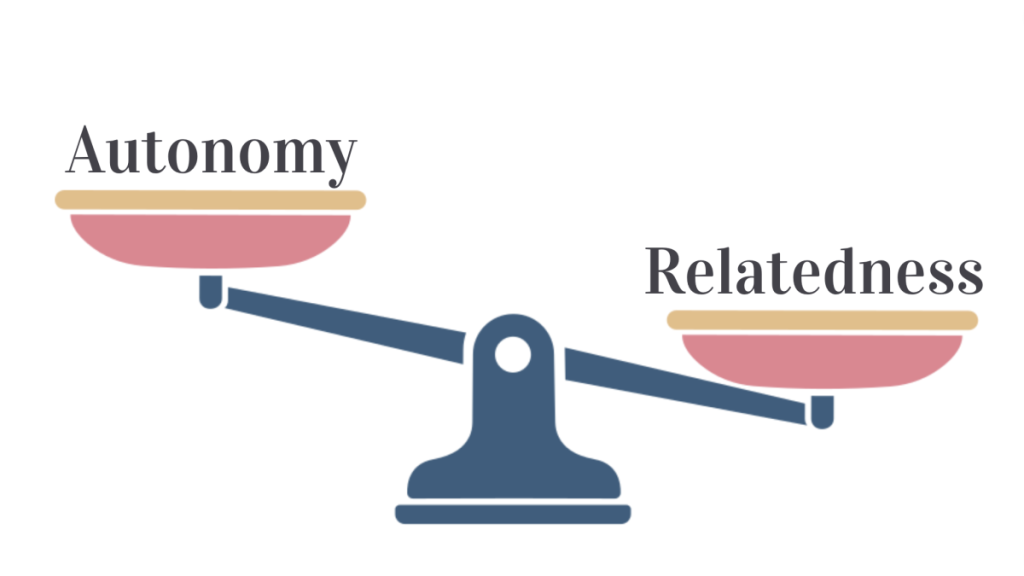It’s an innate part of being human to want to feel a connection with other people. We want to feel like we belong and like we are loved. We long to know that we matter to someone.
Because of this desire for belonging, we are motivated to do things that bring us a sense of connection. That makes sense, right? Of course we’d do that!
But what if some of the things we do because we want a connection with others are actually doing more damage than good in our relationships? What if we are inadvertently sabotaging our relationships with others?
Let’s take a look at some of the ways we might be damaging our relationships so that we can spot them in our own lives and fix them!
Prefer to watch instead of read? Here you go:
Two Things Every Human Needs
OK, so I just told you that we all want to feel loved, connected, or like we belong. For the sake of this article (and because it’s what it’s called in research), let’s call that relatedness.
Relatedness is an inherent human need.
But we also need to feel like we have ownership of ourselves. Like we can call the shots in our own life, like we can spend time developing who we are, and like we belong to ourselves. This is called autonomy.
Autonomy is also a basic human need.
Compatible or Competing?
But what if you felt like you had to choose one need or the other? Like you couldn’t have both autonomy and relatedness? Which would you choose?

It’s possible to prioritize autonomy over relatedness. And this doesn’t make for great relationships, but if you’re choosing that, you maybe don’t expect great relationships anyway.
But what about if you choose relatedness over autonomy? What if you felt like to have really good relationships you had to forsake yourself and lean heavily into the relationship? Would that give you a great connection with others?
Maybe you think yes! A big part of relationships is sacrificing yourself. You’d be right that sacrifice is a critical part of relationships, but losing who you are in the midst of that? Not so good. I mean, who does that even leave for the other person to connect with?
Or maybe you think no! That sounds like a bad way to do relationships…and yet, you’re doing it without actually knowing…Uh oh!
What Does the Research Say?
Here’s where research becomes so amazing (yes, I am a nerd) because it can give us some insight into how these things work together.
So here’s what research tells us about these two things—autonomy and relatedness. (This is from my dissertation.)
We statistically analyzed 1,065 men and women who were in long-term committed relationships. We looked at their levels of autonomy and relatedness and guess what we found?
Autonomy and relatedness balanced each other out. What we didn’t see were people who were really high on one and low on the other.
Instead, what we found was that people were about as high on relatedness as they were on autonomy and vice versa.
In other words, it’s not like you could lean heavily into the relationship and forget yourself and feel that sense of connection you crave. Instead, your sense of connection was closely related to how much ownership you felt like you had of yourself.
Whoa. Did you get that? Taking ownership of yourself matters to the connection you feel in your relationships and science backs that.
What Does Forsaking Autonomy Look Like?
OK, so what does it look like to give up your autonomy? (Because you can’t fix what you can’t see, right?!)
Here are two BIG ways that this can happen.
Self-Silencing
Self-silencing means that because you want to feel like you’re valuable to other people, you care a lot about what they think. (Pssst…most of us do.)
Because you care a lot about what others think, you’re going to do some very specific things that you think will make them give you that stamp of approval that you crave.
One of those things is that you’ll hold back on saying or doing things that you think might upset them. Maybe you won’t speak your opinion in an argument, because you don’t want to rock the boat.
Or you’ll just let them choose where to go to dinner because you don’t want to pick somewhere they don’t like.
You also might try to earn their love by doing things to make them believe you are worthy of it. You take ownership of other people’s moods and try to smooth things out for them, you people-please, you try to be perfect, or you feel like you’ve got to take care of everyone else all the time. (Read more about self-silencing here.)
It’s not a fun way to live, but it’s common.

Emotional Fusion
The other is emotional fusion. You could also think of this as codependency and you’re going to see how it’s similar in a lot of ways to self-silencing.
Emotional fusion means that you rely on other people to make you feel good about yourself. You need their approval to function—so maybe you try to earn their praise, or you can’t handle it if you feel like someone is upset with you.
You might also push your own hard emotions onto someone else instead of coping with them yourself.
Or you merge your sense of identity with theirs and lose a sense of who you are in the relationship.
Again not a fun way to live, but a rampant problem in our world.
Loss of Self
Can you see how both self-silencing and emotional fusion are motivated by a desire for connection? If I feel like I want other people to love me, I might be willing to mold myself into what I believe they want so that they will approve of me and then they will love me, right? I might want them to let me know that they approve so I seek that validation.
But can you also see how these behaviors forsake a sense of autonomy? If I need approval from someone else, then I am putting ownership of my own choices in their hands. I no longer choose what I want but try to meet their expectations.
If I always defer to someone else, or self-silence, I am giving up my autonomy and letting them call the shots in my life. Yikes.
And research backs this as well. People who are high on autonomy and relatedness tend to be lower on behaviors relating to self-silencing. So if we want good relationships, these type sof behavior have no business being in our lives.
So What Do I Do?
If you think you’re the type of person who gives up your autonomy in search of good relationships…join the club!
Only 12% of women and 6% of men in my dissertation study were high on autonomy and relatedness. Most were pretty low on them. So this is a challenge for many of us.
I hope that even just knowing that you don’t have to, and in fact can’t, choose one or the other might help you begin to reclaim who you are so that you can thrive in your relationships. Lean into both!
And spotting and confronting signs of self-silencing and emotional fusion in your life can help too.
As you do that, you’re going to feel more confident in who you are AND better connection with the people you love.



